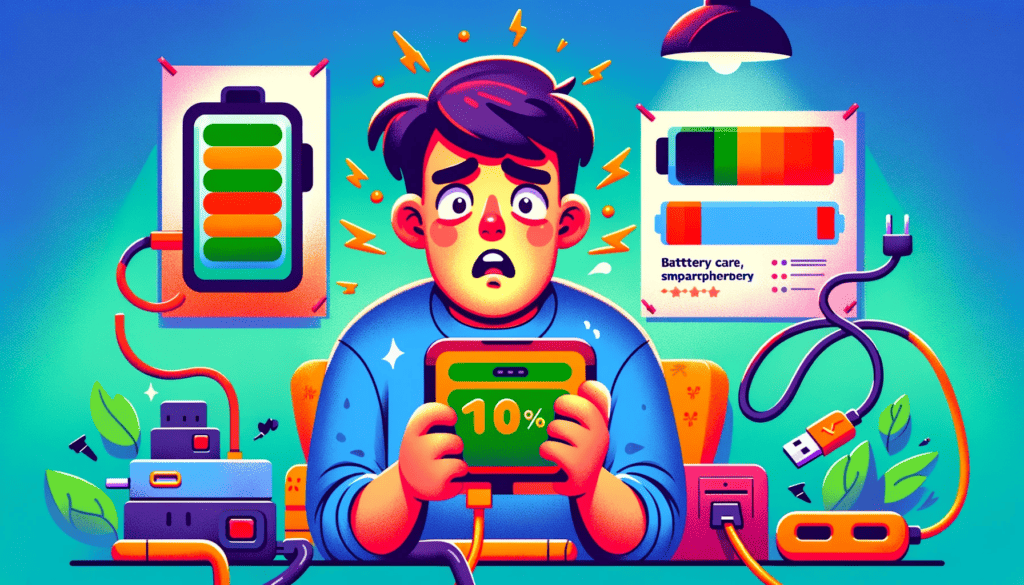
Understanding Smartphone Batteries
The Basics of Lithium-Ion Batteries
Modern smartphones predominantly use lithium-ion batteries, renowned for their high energy density and low self-discharge rate. However, these batteries have a finite lifespan and specific charging needs. Overcharging can significantly impact their functionality and longevity.
The Chemistry Behind Charging
When you charge a smartphone, lithium ions move from the cathode to the anode. This process reverses when the phone is in use. Overcharging occurs when the phone is plugged in after reaching 100%, causing the ions to continue moving, which can be detrimental.
Battery Capacity and Health
Each battery has a set number of charge cycles, typically around 300-500 full charges. Overcharging can reduce this number, diminishing the battery’s overall capacity and health.
The Risks of Overcharging
Shortened Battery Lifespan
Constant overcharging leads to a reduction in the battery’s lifespan. This means your smartphone’s battery will start losing its charge faster and will need more frequent charging or even a replacement.
Overheating Issues
Overcharging can cause batteries to overheat. This not only damages the battery but also poses a risk to the smartphone’s internal components and, in extreme cases, can lead to accidents like fires or explosions.
Reduced Efficiency
When a battery is overcharged, its efficiency in holding a charge decreases. This results in a battery that depletes quicker than it should, hindering the overall user experience.
How Smartphones Manage Charging
Built-in Battery Management Systems
Most modern smartphones come equipped with battery management systems (BMS). These systems are designed to stop charging once the battery reaches 100%, mitigating the risks of overcharging.
Software Optimization
Smartphone manufacturers regularly update their software to optimize battery usage and charging. These updates often include improvements to how the device handles charging, making it safer and more efficient.
The Role of Quality Chargers
Using the charger that came with your smartphone or a high-quality alternative is crucial. Low-quality chargers may not communicate effectively with your phone’s BMS, leading to potential overcharging.
The Myth of ‘Overcharging’
Understanding Modern Technology
With advancements in technology, the term ‘overcharging’ might be misleading. Most smartphones today are smart enough to stop charging once they reach full capacity.
Misconceptions About Charging Habits
Many believe that leaving a phone plugged in overnight will harm the battery. However, due to built-in safeguards, this isn’t typically a concern with modern smartphones.
The Real Issue: Heat
The primary issue isn’t overcharging in the traditional sense, but the heat generated during prolonged charging, which can affect battery health.
Best Practices for Charging
Avoid Overnight Charging
Even with safety mechanisms, it’s good practice to avoid charging your smartphone overnight. This reduces prolonged heat exposure and potential stress on the battery.
Keep Your Phone Cool
Ensure your phone remains cool during charging. Avoid charging in hot environments and remove cases that may retain heat.
Monitor Your Charging Habits
Be mindful of your charging habits. Frequent, short charges are often better than letting your phone’s battery run down completely before recharging.
When to Replace Your Battery
Recognizing Battery Degradation
If your phone struggles to hold a charge or dies quickly, it might be time for a battery replacement. This is common after a couple of years of use.
Professional Replacement Services
Opt for professional replacement services. DIY battery replacements can be risky and may void your smartphone’s warranty.
The Environmental Perspective
Replacing the battery instead of the entire phone is not only cost-effective but also environmentally friendly. It reduces electronic waste and the demand for new resources.
The Future of Smartphone Charging
Emerging Charging Technologies
Research is ongoing into new battery technologies and charging methods. This includes advancements in fast charging and wireless charging, aiming to make charging more efficient and less harmful to battery health.
The Role of Renewable Energy
As the world moves towards renewable energy, the way we charge our devices is also changing. Solar-powered and eco-friendly chargers are becoming more popular, reducing the carbon footprint associated with smartphone charging.
Anticipating Longer Battery Lifespan
Future smartphones may feature batteries with longer lifespans and more robust charging capabilities. This will minimize concerns about overcharging and battery degradation.
Final Thoughts and Considerations
Balancing Convenience and Care
While it’s convenient to plug in your phone and forget about it, a balanced approach to charging can extend your battery’s life. Be conscious of how and when you charge your smartphone.
The Importance of Being Informed
Staying informed about your smartphone’s battery health and charging technology can help you make better decisions, ensuring the longevity of your device.
Embracing Technological Advances
As technology evolves, so do the ways we interact with our devices. Embrace these changes and adapt your charging habits to align with the latest advancements and best practices.
In conclusion, while modern smartphones are designed to handle charging intelligently, it’s still important to be mindful of your charging habits. Avoiding overcharging, understanding battery health, and adopting best practices can significantly extend the life of your smartphone’s battery. Stay informed, be conscious of your usage, and embrace the advancements in charging technology for a better, longer-lasting smartphone experience.






Leave a Reply